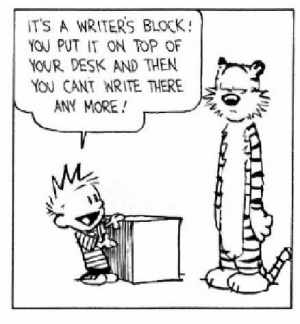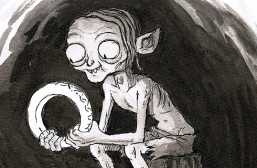Attention Writers: The Myth of Writer’s Block
Writer’s block is the condition we associate with writing and define as writers who lose the ability to produce new work in creative ways, or something that keeps the process of writing flowing in the direction the writer desires. With the Calvin and Hobbes comic in mind, I believe that this is a common misconception, and writer’s block is not what we think it is.

Writer’s Block: What is it Really?
Knowing what a definition is is one thing, but how does this barrier make us feel, and what do we commonly tell ourselves about it? What do we try and do about it, and why are these options usually unsuccessful? There are so many questions we ask ourselves in the moment of writer’s block, and for whatever reason we have no answers, but the answer to why we can’t break the spell is simple. We feel mentally and creatively exhausted, so we tell ourselves we are exhausted, and we can’t switch tracks and enact change because we think there is nothing left. We have used up all of our resources, and the only way to solve the problem is by waiting until we build up more. We are convinced that we have no energy, and therefore no ability to defeat the seemingly undefeatable.
But there is always something left. There must always be something there, hidden and brewing; writer’s block is a figment of our imagination, and only exists if we allow it to. We often say to ourselves, “I can’t come up with anything, I have writer’s block,” and that’s exactly it: it means you’re being blocked by a writer. Instead of thinking of the term to mean something else is blocking us, we need to start thinking that it is ourselves, as writers, who have created these imaginary blockades.
Unlocking the Myth: What to Tell Yourself Now
As mentioned in the previous section, we often tell ourselves that we can’t do something. We find a reason why, turn it into an excuse, and proceed to firmly tell people, “No.” Worst of all, we tell ourselves, “No.” What we need to be doing instead is finding ways to tell ourselves, “Yes.” And this starts out by simply saying, “I can do this.” Sooner or later you’ll realize that you have done this, and you are doing this. You will continue to do this.
Another thing that keeps us from productivity is the escapelessness of time. We’ve found ways to measure it, yes, but in the end it is immeasurable; it is the only thing we never have because it is constantly leaving us. What we need to start thinking is: “The time is now!” Time will not magically give you the chance to build up more energy. If we wait and prolong things to another day, we have only made the mistake of shortening our lives, as we have less experiences to fill it with, less meaning. Less meaning also means a lower impact, and therefore less change. Less progress.
Ask yourself, “If not me, then who?” If you don’t take the time to do it now, who will? Allow the progressiveness of time to fuel you into writing instead of shying away from it. Taking initiative on our own ideas is the only way that other people can come to appreciate them, and we need to take pride in our individual contributions to the community. Altering your perception from believing the issue lies in the external world to seeing it is within you will only help to grow your craft as a writer, and the community with the benefit of a new idea.
Myth Unlocked: What to Do About it
Now that we’ve identified the right attitude, that does not mean we’re ready to start writing immediately. Telling and doing are two different things, and although coaching is important, it requires action. Some helpful tips of what you can do to help make your writing come out clearly and creatively are listed below. They might be the same old tricks you’ve heard before, but then again, perhaps not?
- Switch to a short or small, unrelated task but DON’T put everything aside until another day. You can lose your train of thought, motivation, overall goal, if you wait too long or push these beyond your limits if you try too hard.
- Manage a healthy balance between when you are writing and when you are working on other tasks. One way of doing this is by marking off time-blocks of when you’re working on things in a calendar. Sit down to write even if you have nothing to write about, and this will lessen the onset of writer’s block in future.
- Revisit yesterday’s work the next day. Question it. Mould it.
- Make sure your space is inviting for YOU.
- Eliminate unnecessary distractions, but be sure to involve necessary distractions.
- Knowing how you work is important, so track your progress in relation to time to become more efficient.
- No idea is a bad idea. Save all of your thoughts for later, but keep notes contained to one place so you don’t become disorganized.
- Write about what comes to mind, not necessarily the thing you’re supposed to be writing about. These can come in handy later, too, and often spark a conversation heading toward the right narrative.
- As always, when it comes to writing, a second set of eyes from a trusted, accessible source, or multiple sources, will speak to your work differently than how it spoke through you.
- Most importantly: Remember that the only cause-effect relationship that exists is between you, the idea in your brain, and the paper or screen in front of you.
Ultimately, if you call yourself a writer, then the only thing blocking you from continuing to produce great work is yourself. As long as you keep on practicing your craft, the narratives will write themselves. The ideas are there within you, waiting to be discovered.
More Inspirational Quotes about Writer’s Block
“Who is more to be pitied, a writer bound and gagged by policemen or one living in perfect freedom who has nothing more to say?” ― Kurt Vonnegut
“Don’t waste time waiting for inspiration. Begin, and inspiration will find you.” ― H. Jackson Brown Jr.
“When words don’t come easy, I make do with silence and find something in nothing.” ― Strider Marcus Jones
“The music lets me see the story but the story doesn’t let me write the words.” ― Elizabeth J. Kolodziej
“The scariest moment is always just before you start.” ― Stephen King
What do you think? Leave a comment.











I rarely lack an idea. I lack the gumption to stop whatever unproductive thing I’m doing and grab the laptop.
Yes, this! Or I grab the laptop and a million distractions come up and somehow suddenly it’s two hours later and I’ve completely lost track of what I’m doing…
I free write even if the only thing that comes out the tips of my fingers is,” I don’t know what to write, I don’t know what to write.” You see, the other words are stuck inside and once you get the other words out the doorway is clear and they will come out. I have written some of my best writing following those free writing sessions. It’s just the way it is. At least for me.
Fear and perfectionism are two of my biggest enemies when it comes to writing.
I’m the same. Also procrastination.
Fear and perfectionism are, to me, two sides of the same coin
The beauty behind what I am learning here from you is helping me but also helping me help others. Thanks.
Writing, I think, is the best solution, because when you’re writing, you have their all your emotions, including your senses. It is a mixed emotions that will give peace to your heart at the end of the story or blog that you write.
kill social media: works wonders, if one can!
It’s funny. I was actually having writers block when writing my new article, and your methods are very useful. Thanks for the motivation 🙂
Wow! Very inspirational. This article is very unique compared to others on the site! Good work. I love the quote by Jodi Picoult, “I’ve always sort of believed that writer’s block is a luxury for people who have time on their hands.”
Very interesting, I agree that this is different from other artivles on the site. It is refreshing and a great idea
“The scariest moment is always just before you start.” ― Stephen King
This.
I’ll just start writing about not having a thing to say. And lo and behold, something substantial never fails to emerge …
I sometimes get my dictionary out, and I just start reading words to see what pops into my mind.
One way I overcome writer’s block is by outlining. Knowing where you’re headed helps a lot, even if it’s just a vague bullet point on your plot outline. Every little bit helps.
Pretty much every writing class or book I’ve read, they always suggest making an outline first. Once you map it out, it’s easier to fill in the missing spaces.
When it comes to outlining, we also need to remember that this could be anything – jot nots, mind maps, drawings/sketches, lists, tables, etc.
You can always outline your outline!
I tried watching a movie once to try to ignite my creative juices but after awhile, my brain was drained and I just couldn’t focus. Reading other books help with it and yes, I’m very inspired to write the rest of my book. I just found it difficult for me because of all the distractions around me. After reading this, I can simply use these tips in the nearest future. Thanks for the blog, goodnight!
Just write different. I had a scene where these characters were trying to escape this shithole slum but I was practically stuck there, myself. SO I just decided to change the plot to suit my mood and now I’m 50 pages past there.
The early morning writing has worked for me.
Thanks for this!
I keep a long list of writing prompts on my desktop for particularly difficult days, and I set minimum goals for time and word count each day.
Plain simple tip that WORKS. Just write. Works great for me. I personally found that watching TV is a great disaster (I’ve tried to overcome writer’s block by watching TV – I convinced myself that I was relaxing so ideas could flow) – I ended up paralyzed, totally unable to write for the next few hours!
So much is written about writer’s block, it’s a wonder anyone gets any writing done at all!
I find that my own inability to write is closely associated with high-pressure or stressful situations. When I have an abundance of writing obligations, often the most important/impactful one is the hardest to write. Just sitting down and writing (anything!) usually gets me over it. I usually tell myself that bloviating is fine in these situations, so long as the editorial eye is given its fair shake afterwards.
A jog with my dog, good cup of coffee and then I grab my fountain pen and journal and start scribbling. Eventually, words flow. You just got to write your way through it!
Being wondering if i was empty or blocked. gradually working over it thugh.
I have also discovered that when I consume sugar, I get a little high. When this happens, I grab my Ideas notebook and release the sugar through any ideas I might have. I let it sit for a day (and don’t consume any more sugar!), then I return and use the ideas for a book/story I’m working on or I am inspired to create a new one.
I found putting a draft to one side till the next day helps, it makes you better able to see what corrections and/or amendments are needed.
I agree with you when there is an actual draft to set aside. The trouble I get into usually involves getting it started at all. That’s something I must hammer out if I have any ounce of inspiration at all at any given moment.
I wrote this post because I was feeling inspire by the job application process, and how it can be terrifying to write a cover letter.
Putting the draft aside until the next day in my current situation showed me a lot about myself and how I was keeping myself from writing what needed to come out.
I am so glad that everyone has found this to be helpful and thank you for your warm comments!
I really hope these will work for me. I am experiencing a really depressing block ….thanks for your insight …am starting right away.
Thank you for this article! I really needed to read this right now. The biggest factor that holds me back from writing is always my own fear and self-doubt. I feel self-conscious of my writing even when I’m the only one reading it. The best thing to do is not to censor yourself at all (however tempting it may be) and just keep writing until you get yourself unstuck.
Well said Julia, we most definitely are our worst critics, and need sometimes to just let the flow flow.
When in doubt, remember that you are not alone – even if you are the only one reading that piece – we are all in there somewhere with you!
I agree. It’s just an excuse. Dr. Johnson said a writer can always write. He or she just has to sit down and do it.
Quotes at the end really drove home a lot of the points made in the rest of the article, thanks for that great collection!
I suffer from writers block a lot. Thanks for the tips! I’ll be using them in the future.
Excellent article and very informative…
Ít’s refreshing for an author to admit the existence of writer’s block (lately I’ve seen many writers condemn the muse or the idea of writer’s block), and then go an extra step to offer solutions to this infuriating state.
Here’s to getting out of writer’s block and tying down uncooperative muses!
I function very well with lists. This is something I intend to print and stick nearby. When I become blocked I find myself googling things like “Top 10 ways NOT to procrastinate” which usually leads to an avalanche of unrelated content that usually has me so far from my original task, I forget what I was doing in the first place. I have no one to blame but myself if I’m being honest. It really is a matter of honouring myself, my talent, and the reasons I choose to call myself a writer in the first place. That’s a list I really need to consider sticking nearby.
I have always found that making lists when I am unsure of how to proceed with a situation is the best form of organization. You can see clear, concrete pieces of information corresponding to the subject at hand.
And they’re handy to never forget something for a vacation, too!
Deliberately motivational, a reminder that you have to do everything yourself.
I’ve covered Writer’s Block in my recent book on creative tools for writers,
A really useful article for those of us who write.
I usually have a good idea in my head for where to go next in my story, but I’m always procrastinating. I’m like “Oh, I love this idea…*opens laptop*…man, I could go for a drink! I want to take a nap!”
I agree with some of this, and given the abstraction of writer’s block, the actual finding of inspiration is a strange thing to quantify, and the time being now seems difficult given that inspiration is quite fleeting more often than not. More often than not for me it tends to be that I either have the inspiration for the idea, but no motivation to write it, or motivation to write something but no inspiration for any ideas I’m currently working on. Anybody else deal with that sort of strange writing pendulum?
Summed up quite nicely Sam. This is EXACTLY how I feel as a writer.
Love this “to do” list! From time to time I feel as though I have amazing ideas– I just get bogged down in the words.
Writer’s block is never permanent and, I believe, more a state of mind than an actual thing.
The author here makes a very good point that it is ourselves that creates the writer’s block – not a deficiency in creative energy (though being twenty hours without sleep is certainly a factor). It then becomes the argument that we are our own worst enemies and that our limitations are self-imposed. To break through this, as a writer myself, I’ve found the best way is to simply write about the writer’s block. This will deconstruct the neurosis that there is nothing to write about or that the creative energy is lacking and simply remove the wall obstructing our ability to be creative once more.
Introducing the culpability of time and the necessity to ask “Who else?” is intrinsically important to breaking through writer’s block, as the article states. Returning to the idea I just wrote about with writing about writer’s block (damn that sentence feels weird), I will turn the idea on its head a little. Say that you wish to write an argumentative piece, but you do not know where to begin. I say begin by writing the opposing argument! So often do we know what we disagree with, without the knowledge of why we disagree! Exploring the opposing side will often illuminate our own view, or – dare I say it – change these views because we touched upon something that we had never considered before exploring the opposing side.
The cure to writer’s block is to simply write. My thought is that, I start to think too much (where’s this going? did I spell that right? what should I put next?), rather than allow myself to pour out a stream of consciousness. Writing is easy. Stop blocking yourself.
Writers Block can only be resolved if you do not isolate yourself; being around others helps you spark ideas. There are many aspects of reading you can describe when going outside like, sight,smell,touch and taste. These are the elements you should discuss in your writing in order to fight writers block and try not to be in the same place every time since your writing may become redundant. Be in different places at different times and then just write about it. Discover new things, people,food, and entertainment outside in order to surpass such a phase of having writers block. Its that easy!
Salma Khan
For me, I lost a strong amount of zest for writing as soon as I lost a format for me to get my works out to people. I feel as though when you have an audience you know you want to write to, ideas are much easier to formulate. This is different from just pandering to a certain demographic though. I feel it is better to find an audience that enjoys you own oringinal ideas more than what they want to hear or read from someone
The surest truth I know about writer’s block is that it often is a symptom of trying to write something the writer was not meant to write. Doing public relations for a state agency, I often struggled with writer’s block because I didn’t believe in what I was writing. Get in touch with what is inside you and transfer it to the page. That’s how you cure writer’s block.
I have used this term “writer’s block,” numerous times throughout my academic career. What you refer to as “myth,” I refer to as “torture.” Though that sounds dramatic, I feel like a tortured soul when I feel as though there’s a breach between my thoughts and my ability to translate these thoughts onto the page. I have heard numerous artists discuss having an “artistic block,” and writing, in my opinion, is an art. Heck, I think the ability to critically read a text is a form of art. Therefore, while I wouldn’t go as far as referring to writer’s block as a “myth,” I must admit that your ideas about combatting it are excellent.
You provide realistic pointers that can only come from a fellow writer who understands the ‘myth.’ I feel sometimes our brains need a bit of rest; an appreciation of the world around us to get our creative thoughts flowing and to reach a level of peace and clearheadedness. To combat my moments of writing inactivity, I have slowly been encompassing mindfulness into my daily activities. By being more mindful, I definitely experience a closer relationship with the world, which makes me look at things in less black and white means.
Another point I must commend you for is suggestion of finding a “healthy balance.” Beating oneself up for not being able to produce a piece of writer is counterproductive and a waste of time. Staring at a blank page or computer screen only increases one’s attention while decreasing one’s belief in his or her self. One formula I abide by is: Stagnation =Ruination. To be stagnant in activity and then harping on the inactivity creates a horrible environment filled with negative energy and a lack in productivity. Thank you for writing on a topic so pertinent to all of us writers, and for including advice that makes sense and is helpful!! Nice work.
This article is very helpful! I never thought of a writer’s block being the writer blocking themselves. The tips were a real eye-opener for me. I have been giving up way too easily. Thank you for this!
This was the perfect piece of motivation for me. Writer’s block can be used too easily sometimes, and this article is incredibly well-phrased and now I don’t think I will ever have an excuse again!
Great piece! I especially like tip #8…I do that all the time. Even just journaling can be helpful; you never know when you’ll write a really beautiful turn-of-phrase to be used later . Another thing that’s super helpful is looking to established writers for inspiration. A lot of times, if I have a message I want to communicate and don’t know how to do so, I read a passage from a book with a similar theme and see what devices that writer used. Obviously, you don’t want to use an identical strategy, but it can give you some good ideas about relevant imagery, structure, symbols, etc.
I really enjoyed those quotes. I always have a flood of ideas but very rarely go through with them and then forget. Try writing and see what comes out of it, nice idea.
In my own experience, what keeps me from writing is that I put all my other tasks before it. So only when I have nothing else to do is when I can sit down and write for a long time. Lately, I’ve been carrying around a journal everywhere I go. I write down ideas that come to my mind at any point of the day. That makes me feel that I have ideas that need developing, so it makes it easier to think of my writing as one of the many things I have to do for the day.
I’ve been trying to convince one of my friends to stop talking about her story and to just write it. I hope this article will help her. I’ve never really struggled with writer’s block because I learned at a young age that you can’t just stare at the page, you have to actually try forming sentences even if you don’t like those sentences. It’s not about how good it sounds originally, it’s about getting the words down on paper. If you don’t like it you can always change it later. Thank you so much for writing this!
I always tell writer-friends of mine who face Writer’s Block to just write. Something will snag your mind. Write down a depiction of what you wish you were doing right now, paint an ideal image of what you would love to be off experiencing, write a letter (sometimes unstressed rambling gets you through any self-doubt about writing), or the old fall back is to just free write. Just ramble-write.
Good tips! My best thoughts and ideas always come when I DON’T plan to write and have no way to record it all…like when I am running, or driving. By the time I sit down to put it all together, I’ve lost the words, and my “groove!”
Story of my life!
I thought this article was wonderful! Well done and well written! I also loved the addition of the inspirational quotes. Well done!
Very helpfull article, personally I find my creativity is at its peak when Im experiencing an intense emotion. Sometimes even the frustration of writers block is enough inspiration to get the wheels turning. I think its great to have methods to practice getting yourself out of the creative slump rather than giving up.
This was an inspirational article. I often find myself saying Im a victim of “writers block”. I always knew it was an excuse but I just wanted to justify my unproductivity with a name. But I know not to do that anymore! Thanks for this.
I’ve always found motivation and inspiration to be devils in disguise. I’m trying to follow the path of discipline, since motivation and inspiration are only ever temporary, much like writer’s block is. When I’m facing, I sit down, and I force myself to start writing until the block is gone; I don’t care what I’m writing about, I just keep on writing and writing until I overcome it. I see discipline as the only true weapon against the torture that is writer’s block, and the only way to keep it at bay, and the more people practice, the more it is reduced. Now, there are still those times where nothing seems to get rid of the writer’s block except time, but it happens to all of us, and we’ll all make it through it, whether it’s with the help of this article’s tips, or something else altogether.
As I am working on my final Journalism project, this is great advice. Thanks!
Meditation has helped me to better work out any sort of writing block, but when it comes to that exercise, it takes a lot of effort! It is definitely not for everyone.
As a graduate student, #2, #4. and #6 are extremely important to me as I do a ton of writing practically everyday. Writing is essentially an element of what I do daily, so I like to consider it akin to running or working out mathematical problems on a daily basis to just keep up with it as a practice.
“You can’t wait for inspiration. You have to go after it with a club.” -Jack London
This is the writing quote I live by. I’ve always gotten around writer’s block by simply not believing in its existence. I can’t possibly run out of words; therefore, I can’t possibly have writer’s block. I may suffer obstacles in determining what happens next or how to say it, but it’s not a block. And the only way to get through it is simply that–to get through it.
I love a “value-added” article. I didn’t feel that this article spoke to anything new. It was well written, but it lacked unique ideas or entertaining metaphors to cause me to want to read on. It was just another typical article about writer’s block, which I think we can all agree has an element of mythology to it. We can always find something to write about; however, it is only once in awhile that our writing is really good and unique. Hell, that’s the point…if it were easy to produce awe inspired works everytime we touched a keyboard everyone would do it. Scott
I had never really thought about what drives my writer’s block until now, and this made so much sense! Mine is always when I feel like I don’t have the energy or motivation to write my best work, and so I create my own writer’s block. There are a lot of helpful ideas here that I’m excited to try.
This is an excellent article and a very good point. It is important to examine our own blocks to writing and counter them.
The article applies to musical composition as well.
At some point, you just need to start writing. I guess I take writers block as an excuse. I mean, as a writer, you will never be happy with any idea you are going to have, so the worst thing is to keep thinking about another better one and dont write anything at all.
But yes, when I was truly happy, I actually kind of had a writers block. Once my life became such a mess, I had so many ideas for stories. I just havent felt like writing them down.
I have to say, this article is really spot on. At least it is in my case. The problem usually arises in the execution of my ideas than in the ideas themselves. I have the type of focus that’s geared towards the big picture rather than the details. Unfortunately, those details include words, sentences, and paragraphs…
Mostly I find that I end up writing more about things that are completely different than what I intended. It starts with what kind of cake I like and why, ends with why cows are sacred in India. As long as it’s something, and it’s fulfilling, then I guess it’s alright.
“Instead of thinking of the term to mean something else is blocking us, we need to start thinking that it is ourselves, as writers, who have created these imaginary blockades.”
I relate to this on so many levels. Every time I get writer’s block, I feel sick. Literally. It’s one of the worst feelings in the world. I realized though, like you said, that it wasn’t anything else that was blocking me. It was me. If I wanted to get out of writer’s block so much, that’s just what I needed to do. I needed to take action. I needed to get out.
So I did. Literally. I applied for a missionary internship and I got out of my hometown. I met new people. I explored. I traveled. I saw beauty and nature. And guess what happened? I was writing again. The block was gone. I was free once more.
Now I’m not saying everyone has to necessarily do something as drastic as what I did, but it’s the same concept that you’re talking about. We as writers need to get past our own writer’s block because, ultimately, we are the ones creating them. We are the ones holding ourselves back as writers. Only we can change that and get working again.
So do whatever it is you need to do. This article gives some good advice on how to get writing again, but just do it. Never stop writing.
Although you seem to be referring mainly to creative writing, I have definitely been experiencing “writer’s block” with the 3 papers I have to write to finish off this semester. And you’re right – the block is certainly not a lack of ideas, it’s me. I appreciate the tips you include in the end. Hopefully I’ll use them throughout this week to get myself through all the work I need to get done.
Great list of tips, and awesome article as well! I especially like the advice to find ways to tell ourselves “Yes” instead of “No.” Fear contributes to the delay of productivity.
I agree with the author, that writer’s block doesn’t actually exist. It is more a figment of the imagination, a self-imposed anxiety about one’s ability to proceed. I’ve always found that there are several ways to help combat the block. I think routines are important. For example, I do all of my writing in the morning hours, before the hum-drum and stress of the day have been able to cloud my mind. I also agree with the author that creating a quiet, comfortable and distraction-free space to write in is crucial to keeping productivity high. And, even when I feel something akin to the block coming on, I typically force myself to write anyway. Just write. Anything. Even if it sucks. Even if you end up deleting it all the next day, at least you didn’t allow your mind to make your body PHYSICALLY stop writing.
I also think the way in which an author should combat the block depends on the style/genre they are writing. If I’m writing poetry, and I feel blocked, I will sometimes go through a collection of quotes that I have (miscellaneous citations from various writers in various styles and fields which I found interesting or inspiring.) Sometimes I will find words in this collection that will get me over the hump. Another trick I use when writing poetry is to walk away from my morning writing time and go about my day while purposely keeping the poem in the forefront of my mind. I will juxtapose everything I see, hear, taste, smell, and touch onto that blank spot on the page where I last left off, before the block began, and see if anything starts to fit, if anything starts to inspire me again.
If I’m writing an academic piece, I will usually combat the block by seeking advice and feedback from peers (especially someone who is more well-versed in the subject than me.)
If I’m writing fiction (flash/short/novel) then I will go back over all my notes and reread what I’ve written thus far. By going over my notes again I am often able to put my mind back into that fully inspired and enthusiastic place it was in when I decided the idea was worth writing in the first place.
I know it feels ironic to say this, but the internet is a huge distraction for me. I always find some way of holding off on writing in favor of other more entertaining activities. I would say, aside from my superb procrastination skills, the fear of not writing the “right” thing is another big aspect of my “writer’s block.” I think as writers we tend to see other people’s work as if it were the result of some brilliant “stream-of-consciousness” instead of being the result of edit upon edit and revision. That’s a really intimidating feeling. Sometimes though, it’s just best that I don’t concern myself with “writer’s block” at all. If I don’t get overly concerned about whether I can overcome that hurdle or not, the less of a problem it is. I shouldn’t make an enemy out of “writer’s block” because then I’m just fighting with myself, which isn’t really the brightest idea. My “writer’s block” is likely there for some reason and trying to tell me something, whether I like it or not.
It’s funny. Reading this article, it seems like it would be easy to make writing less frustrating and more flowing. I’ve tried most of these suggestions before, and it just never works out for me. I get stuck. I get frustrated. I want to scream. It’s truly a horrible experience, but I still love to write. I will try these again. Most likely over and over. I keep telling myself it will eventually get better. I don’t know if I’m optimistic or delusional.
“No idea is a bad idea.” I very much enjoyed this article and this quote stood out to me the most. Yes, not every idea will make it into your writing, but it is important to track each step along the way. Writer’s block is typically a way of telling yourself, as a writer, “I don’t know what to do.” Despite this, I find that I am almost always thinking about my writing. It is on my mind at a consistent rate, even if I’m not trying to think of new ideas or how to progress in the story. Sometimes just looking over my notes or character/story descriptions can get me back into my work.
For me, the key is to never forget what my writing means to me. I may not have everything planned out piece by piece, but I know that I’m not just going to give up on my work if an idea doesn’t come right away. Everyone experiences some slowdown in their writing. From the very start of a story it’s already easy to be lost, but odds are if you’ve made it past the first scene, you can find a way to progress from there.
If you created a “block” with your writing the only way to fix it is with writing. Any time you feel opposition to stop you from something amazing that is proof of how much more important it is for you to accomplish it. I feel like writers block applies to ALL parts of art (it’s always temporary). Sometimes when your painting or drawing there’s always that moment where you’re staring at that blank page not to sure how to translate what’s in your head onto paper. Writing is creating a daring communication in silence. Don’t fear the silence, embrace it. Once you do turn away from it for a few hours and then come back to your piece very critically to edit, erase, or fix keys. I have perfectionist problems but I only have those problems with my own passions. I can never look at my work and be completely satisfied, I always look at it particularly imperfect because I am the only one that can see it’s flaws very clearly. What helps me is journaling, use writing in different ways. Ponder on certain things and I pour out my feelings and my desires, it helps me to find my true purposes in current moments of my life.
I think part of the problem of Writers Block for many is the innate procrastination that feeds it. Putting writing off pushes away creativity, so when you finally want the creative juices to flow, it’s too far suppressed to use. Working on getting over that myself.
What a beautiful article. I can see from the comments that it’s helped a lot of people, and I’m happy to say I’m one of them!
My professor actually introduced us to a quote a few days ago that also helped me with my fallacious notion of ‘writer’s block:’ “Each person who sits down to write faces not a blank page but his own vastly overfilled mind. The problem is to clear out most of what is in it, to fill huge plastic garbage bags with the confused jumble of things that have accreted there over the days, months, years of being alive and taking things through the eyes and ears and hearts.”
Essentially saying: it’s all in there! Just the act of wanting to write means you’ve got something! 🙂
I really like this. It’s actually helpful. I’ll definitely think about this next time I am about to wait until 3am to start writing a paper
The first page problem. I found in school I would look at the first page of my assignment and wait for the first word to appear. Of course it never did, and eventually I found that you just have to start writing. It doesn’t matter what, just write. Your first page will suck, just like the first pancake is always burnt, but the second page will be much more coherent. Generally I delete that first page, which is tangentially connected to my point, but in time that initial failure, which I deal with upon every new paper, becomes gold.
This post gave me inspiration to dust the cobwebs off my ballpoint pen and notebook and start writing again. I can’t wait for ideas and inspiration all the time, because simply I am wasting time. Writers block hits when I have a paper to write for school. I start a brainstorm and the ideas flood out, but as soon as I open up a document….it stays empty for days. Maybe it might be a perfectionist thing.
I feel like I suffer the doom of “writers block,” every time I go to write but really I think it’s just a fear of not saying what I want to articulate perfectly combined with procrastination. Thank you for this. Instead of saying no, I will use that as an incentive to say yes.
As I like to say, if you’re going to tell yourself a story, make it a good one that you want to hear. Instead of telling yourself, “I’m blocked,” tell yourself that THIS idea is the one that most wants to come to life, and it’s your job to be Dr. Frankenstein and animate it. Tell yourself that you can write, and prove it by doing so.
Great article and tips! But to be honest i think most people suffer from stopping what they are doing at the moment to actually grab their laptop or pen/paper and write down their ideas.
“that’s exactly it: it means you’re being blocked by a writer.” That was a lovely line and absolutely clear. one of those things that should be turned into a poster to be tacked up above the writerly desk. thanks for the helpful read!
The most helpful strategy I have found in productivity is breaking down the day into 1 hr task segments with a break in betwwen in which ensues a small reward like the morning cup of coffee. Try it!
What I love is that sometimes, a problem in the story you’ve been thinking about for a while suddenly connects to something you see or do and the light bulb goes on. I feel exhilarated by the spontaneity. Writer’s block reminds me of Emma Thompson in the movie “Stranger than Fiction”.
This is a great piece. I agree with the notion that writers block is all in our heads, and we need to focus on ways to allow ourselves to eliminate that thought. I believe that we as writers, all to often, get so caught up in our minds that we find it difficult to truly allow ourselves to write and expand our creativity.
Thanks for the interesting read. Most of the methods mentioned are pretty straightforward, but a couple of them definitely deserve a try if one gets stuck.
11. Get an actual Calvin and Hobbes “writer’s block,” pick it up (carefully! It’s heavy!) and put it on your desk. Take a breath, pick up the block, move it off your desk, and start writing, because you’ve just rid your desk of a writer’s block.
There is a simple state of mind that aspiring writers like myself suffer from: fear. Writer’s Block comes to me everytime I pick up a pen or my computer and after about ten minutes I’m searching online how to combat writer’s block.
The reason I have found common among almost all accounts is not the fact that we can’t write, but that we are afraid: writer’s demand perfection from our work, it’s how we are. Therefore, the mere notion of all of our hard work becoming lost to the seemingly infinite amount of writing out there scares us not into writing at all. So, in reality, all writers, whether seasoned or new, must accept the fact that their imagined masterpiece will most likely be written, reread, edited an incomprehensible amount of times and STILL end up as tinder for our fire and that after all that change everything we ever thought about what we wanted to write.
I often stare blankly at my computer screen when attempting to produce A-level essays so this is an interesting approach to writer’s block. I feel like that term was created because writers want something abstract to blame for their inability to produce quality content. I would still rather think of writer’s block as an entity in itself instead of blaming myself hahaha.
I sit here, browsing the Artifice – procrastinating writing! But, I do think writer’s block is certainly something to be overcome with the mind. Interesting article. It can be so hard to just start sometimes.
A very resourceful article; one that I think addresses one of the core issues that the majority of writers struggle with, and lists numerous tips on how to overcome the myth of writer’s block!
thanks a lot for this! very enlightening!
Thanks for the tips! I also find that going and walking around the place I’m writing in helps.
Gawd, I love Calvin and Hobbes. And, oh yes, this article does a good job of fleshing out the cartoon at the outset . . .
My way of dealing with writer’s block is simply continue to write. Then to a certain point writing gets wired into you. It really is a quite helpful way to overcome writer’s block.
Being a young writer I find it not only hard to find time to write because of school and other after-school activities, but also hard to find things to write. For so long I thought that this was merely because I simply couldn’t think of anything. Even when I found something I couldn’t even finish it. I would write maybe a chapter (if it was a book I was writing) and then I would lose it. This article has definitely got me thinking in a different way. Maybe I can continue and maybe finish those books and short stories I have sitting in a pile.
It’s about the work… I hear.
“Before I was a genius I was a drudge.”
-Ignacy Jan Paderewski
“I’m going to do something, even if it’s wrong.”
-my dad
It seems to me that writing is to reading as self-employment is to working for others. The first, uncharted territory; the second, well trod.
Writer’s block is a sign of anxiety for me. Although the author says it is a myth, from my own experience, I find it more of a symptom of my mental and emotional state.
” What we need to be doing instead is finding ways to tell ourselves, “Yes.” And this starts out by simply saying, “I can do this.” Sooner or later you’ll realize that you have done this, and you are doing this. You will continue to do this.”
This is exactly what I did when facing college algebra. This is called the growth mind set. Believing that hard work and practical strategies will get the job done! We are what we speak!!
I love the line, “writer’s block is a figment of our imagination, and only exists if we allow it to”. I sometimes get to a point where I’m not sure where to go next in my writing and so I take a break and allow myself to stop thinking about it. This usually stops my creative thinking and keeps me in a spot where I experience “writer’s block”. Pushing through the “block” is the best way to get past it.
I can see both sides of the debate, writer’s black is as personal as a writer’s process. These tips look helpful to trry and power through it but I’ve experienced writer’s block before and I had to wait it out
Good tips. I love #s 3 and 7. I once had a professor whose favorite joke was, “If you don’t have a good ending, just write that an asteroid hits the earth.” I also like the phrase, “If you’re stuck, have somebody come through the front door with a gun.” Those don’t work for every story or every genre, but they are fun to try. Sometimes they even help you come up with an idea that fits.
This is so key, imo: “We often say to ourselves, ‘I can’t come up with anything, I have writer’s block,’ and that’s exactly it: it means you’re being blocked by a writer.”
I find it funny how writer’s block can be overcome with more writing. Sometimes I take a break from my piece and start writing about whatever is on my mind, and it’s kind of like a “hah! I told you so!” moment. Don’t let your mind play tricks on you!
Love the article! Whenever I have writers block I feel it’s because I’ve lost focus on what I’m really meant to be doing, which is telling a story. I have to remind myself to never lose sight of the story, and when that happens, the ball starts rolling again.